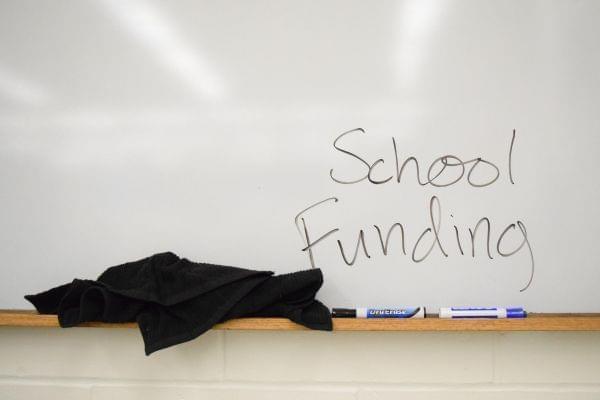ISBE Asks For $15 Billion “Equitable” Funding

The Illinois State Board of Education today voted unanimously to ask the General Assembly to practically double state funding for public schools. Carter Staley/NPR Illinois
The Illinois State Board of Education today voted unanimously to ask the General Assembly to practically double state funding for public schools.
Last summer, the legislature voted to change the way Illinois funds schools by adopting what's called an “evidence-based model.” That model weighs what each district needs against its local resources. As it turns out, some districts can't achieve even 50 percent of adequate funding, while others have almost three times what they need.
Citing the state constitution's requirement to be the primary provider of education, and their own role as an “advocacy organization,” ISBE approved a $15.7 billion budget request.
Board member Kevin Settle makes it sound reasonable.
“I think it's our responsibility to ask for what it takes to fund each school in the state so each child gets the education they need and deserve,” he says.
The problem with inequitable funding is that — despite that wide variance in resources — students are treated exactly the same in one crucial way:
"Everyone takes the same tests in Illinois that are approved by the State Board of Education,” Settle says. “So all schools and all students are held accountable for, well, for the same standardized tests or assessments."
But he admits it will be difficult for lawmakers to cough up that kind of dough.
"I think it will be difficult for the legislature to find the extra $7.2 billion. But again, we're asking for what we need to fund the schools adequately," he says.
He said the board members were persuaded after holding hearings over the past three months, and hearing educators talk about the challenges they face with inadequate funding.
"And when we heard all of the statements throughout the hearings — in Springfield, Chicago and Mt. Vernon — we decided that we would ask for what was needed," he says. “And there was no collusion. We all read what we read, and we voted the way we wanted to vote. So there was nothing that was pre-determined about it.”
Links
- Education Board Calls For Swift Action On School Funding
- After Rauner Veto, Lawmakers Consider Next Steps On School Funding
- Private Schools In Limbo As General Assembly And Governor Haggle Over School Funding Language
- Bill Links Private School Tax Break To Public School Funding
- Governor Signs School Funding Reform Bill
- State Senators Discuss School Funding Bill; Jaggery; Baby Pigs And The Microbiome
- Area School Superintendents Relieved School Funding Bill Passes
- How Much Credit Should Rauner Get For School Funding?

